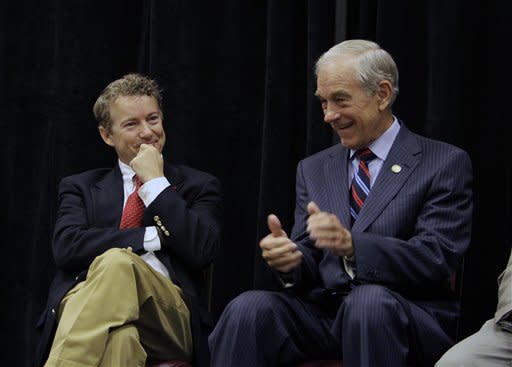 The Ticket
The TicketRon and Rand Paul split on ‘Cut, Cap, and Balance’ bill

Father and son Ron and Rand Paul agree on most things, but when it comes to the finer points of how to proceed on raising the debt ceiling, they're split.
Ron Paul, a presidential candidate and House veteran who has never voted to raise the debt ceiling in his two decades in office, was one of only nine Republican House members Tuesday to vote against the "Cut, Cap and Balance" bill that would raise the debt ceiling in return for a Balanced Budget Amendment to the Constitution. He said the bill, which was championed by his son, Kentucky Sen. Rand Paul, didn't go far enough to address the nation's spending pattern.
The elder Paul was the first presidential candidate to sign the "Cut, Cap, and Balance" pledge, but took issue with the amount of spending within the final language of the bill.
"While I applaud the spirit of the Cut, Cap, and Balance Act (CCB) and appreciate how it has shaped the debate to include a permanent solution to our deficit crisis, I could not support the legislation as it was presented today," Ron Paul said in a statement Tuesday night. "The CCB act would add $2.4 trillion of new debt to our gargantuan $14.4 trillion debt. CCB would also only cut $111 billion from this year's budget, allowing a deficit of nearly $1.5 trillion. This is far from the Pledge's call for 'substantial' cuts."
In the upper chamber, however, his son applauded the successful House vote and confirmed that if given the chance, he would give the bill his approval in the Senate.
"I commend my colleagues in the House for passing legislation that leads us toward a solution," the younger Paul said in a statement shortly after the House vote. "I implore my Senate colleagues to follow the same path in voting in favor of this bill, and for the President and his Administration to stop playing games with this matter and support the important goal of defeating our debt and balancing our budget."
This is not to say the two are divided in their belief in the need to reduce the federal deficit and rein in spending. Both said they share support for the spirit of the legislation, but when it comes to specific bills, history has shown, a vote from Ron Paul--known familiarly in the House as "Dr. No"--is often a tough get.
Tuesday's House vote was largely seen as symbolic. It's not clear if the Senate will take up the legislation, and President Obama has vowed to veto it if the bill in the unlikely event that it reaches his desk.

